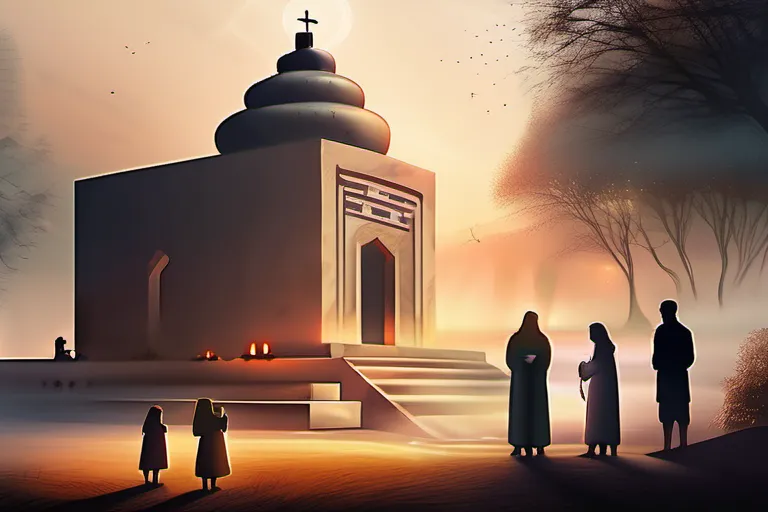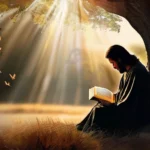Explore the role, history, and impact of religion on society and individuals.
Religion has been a fundamental part of human civilization for thousands of years. In this article, we delve into the purpose of religion, its evolution, and its influence on various aspects of life. Join us as we unravel the mysteries behind this profound topic.
The Origins and Evolution of Religion
The origins and evolution of religion are like a vast, intricate web that has been woven over thousands of years, connecting individuals to communities and societies to their cultural tapestries. Have you ever wondered how religion began? Was it born out of necessity or simply out of curiosity about the unknown?
Some argue that early humans developed religious practices as a way to explain natural phenomena, providing comfort in an uncertain world. Others suggest it was a social construct, a means for cooperation and order within early human societies. Either way, religion has transformed over time, adapting like a chameleon to fit the changing needs of humanity.
Consider how ancient civilizations worshipped nature deities or sought guidance from ancestors. As empires rose and fell, so too did religious practices, evolving into more structured belief systems with complex hierarchies and rituals. The rise of monotheism brought about profound changes, challenging traditional beliefs and reshaping entire cultures.
Throughout history, religion has played a pivotal role in shaping societies, from the formation of political states to the development of ethical codes. It has been both a unifying force and a source of division, often dictating behaviors, norms, and values that individuals must adhere to. How do you think religion would change if it were to adapt to today’s globalized world?
As we look at the past, we see religion’s influence on everything from art and literature to science and technology. It has inspired great works of beauty and innovation but also instigated violence and conflict. Can we find a way for religion to be a force for good in our interconnected world? The journey is far from over, with more questions than answers waiting for us as we explore the ever-evolving landscape of religious practices.
The Role of Religion in Society
How does religion shape the very fabric of society? It’s like asking, can we fully understand the complexity of a city without considering its cultural landmarks and social networks? Religion often acts as a lighthouse, guiding societies through moral and ethical dilemmas. Throughout history, it has played a pivotal role in defining what is considered right or wrong, good or bad.
Think about the societal norms we hold dear—family values, community service, even legal systems. Many of these norms have roots in religious teachings. For instance, the concept of charity can be traced back to ancient religious practices. But why do some societies embrace such values more strongly than others? Is it because they’ve been influenced by a particular religion or simply because their leaders have found these principles effective for governance?
Moreover, consider how religion impacts economic and political structures. Historical events like the Protestant Reformation in Europe led to significant changes in economic policies and political systems. Religion can act as a catalyst for social change, pushing societies towards reform or maintaining the status quo.
The impact of religion on individuals is just as profound. It shapes their behavior, relationships, and even their sense of purpose. But how do these individual beliefs interact with broader societal norms? Can an individual’s religious practices conflict with what they perceive to be the greater good for society?
Religion often serves as a unifying force in times of crisis, providing comfort and support. Yet it can also be divisive, fostering conflict between different groups. The role of religion is multifaceted; it can heal or harm, inspire or divide, depending on how it’s practiced and interpreted.
Religion and Individual Beliefs
Understanding the purpose of religion often starts by examining how personal beliefs are formed and shaped through religious teachings. Think about it—how do these teachings resonate within us, influencing our daily lives and decisions? Religion acts like a compass, guiding individuals through the complexities of life with its moral codes and spiritual support. But where does this guidance come from?
Imagine religion as a vast ocean, with personal beliefs being the unique waves that each person creates. These waves are shaped by various factors—family traditions, community values, historical contexts, and personal experiences. Religious teachings provide the water of this ocean, nourishing and shaping these beliefs. For instance, consider someone who grew up in a Christian family where regular church attendance was part of their routine. How do the teachings of forgiveness and love from Jesus Christ influence their actions towards others? It’s like planting seeds; religious teachings are akin to those seeds, sown deeply into an individual’s psyche, growing into strong beliefs that guide their behavior.
Moreover, consider how these beliefs impact various aspects of an individual’s life. In the workplace, a person’s religious beliefs might affect their interactions with colleagues and customers. At home, it could influence family dynamics and parenting styles. Even in personal relationships, religious teachings can provide frameworks for understanding love, respect, and responsibility towards others. But here’s a question to ponder: Can you identify moments when your own religious beliefs have acted as guiding lights during challenging times?
The impact of these beliefs is profound; they shape not only how we view the world but also our place in it. They can inspire acts of kindness, drive moral decisions, and provide comfort in times of distress. Reflect on a time when you felt supported by your religious beliefs—a moment when everything seemed to fall into place despite life’s uncertainties. How did these beliefs help shape that experience?
By delving into the personal impact of religion, we uncover its true essence as a deeply individualized yet collectively shared journey. It is through this exploration that we gain a deeper understanding of why religions exist and how they continue to evolve in our modern world.
The Impact of Religion on Culture and Art
How does religion shape our cultural landscape? It’s as if religion is a river, flowing through history and carving out valleys in the fabric of society. Imagine, for instance, how religions have influenced art throughout the ages. Have you ever wondered why so many paintings depict religious scenes or figures? The answer lies deep within the human soul, where faith meets creativity.
Religion has been a constant source of inspiration for artists, musicians, and writers alike. Consider the vibrant murals in ancient churches or the melodies composed in praise to deities. Each stroke of the brush or note on the piano resonates with the belief that there is something greater than ourselves—a divine force that touches our lives. In literature too, religion often serves as a backdrop, weaving its threads into the fabric of epic tales and moral lessons.
Take, for example, Shakespeare’s Romeo and Juliet. The play’s tragic love story is intertwined with the feud between two families, which ultimately leads to their demise. But beyond the drama, there’s a deeper reflection on sin, redemption, and fate—all themes rooted in religious doctrine. Through these narratives, religion shapes our understanding of good and evil, and the human condition.
Moreover, consider how music is often used in worship or during festivals. It’s as if the melodies themselves are prayers—lifting hearts and souls to a higher plane. Each song, each rhythm, carries with it the weight of tradition and belief, binding communities together through shared experiences. This cultural fusion is not just artistic expression; it’s a profound way for people to connect with their faith on a visceral level.
In this way, religion permeates every aspect of culture, shaping its very essence. From the visual arts that adorn walls, to the sounds that fill the air, and the words that inspire and instruct—religion leaves an indelible mark. It’s not just about what we believe; it’s how those beliefs manifest in our daily lives and shared experiences.
So, when you next visit a museum or listen to a song, think about the invisible thread of religion that connects us all, weaving through the fabric of society like an intricate pattern, guiding culture and art.
Religion and Morality: A Complex Relationship
When we think about religion, it’s easy to get caught up in the surface-level aspects like buildings and rituals. But what if we peel back those layers to explore the heart of religious practice—the connection between religion and morality? How does this complex relationship shape our understanding of right and wrong?
Religion often serves as a moral compass, guiding individuals on how to live their lives. It’s like having a map in an uncharted territory; without it, one might wander aimlessly or even get lost. For many, religious teachings provide clear-cut answers, but for others, they offer a framework that must be interpreted and applied to modern contexts.
Take the Ten Commandments as an example—these guidelines are like a set of traffic lights in society, helping us navigate ethical dilemmas with ease or at least providing direction. However, just as there can be misunderstandings about which light means what, people sometimes interpret religious teachings differently, leading to diverse practices and beliefs within the same faith.
Moreover, religion’s role in shaping moral values is not static; it evolves over time, much like a river that changes its course due to shifting landscapes. For instance, consider how the treatment of women or minorities has shifted in some religious communities over centuries. This transformation highlights religion’s capacity for growth and adaptation.
But can we rely solely on religious teachings to guide our morality? Are there instances where these teachings may conflict with contemporary ethical standards? These questions invite us to critically examine the relationship between faith and morality, prompting a deeper dive into how different religions address similar moral issues in unique ways.
Ultimately, religion’s influence on morality is profound. It plays a crucial role not just in shaping individual behavior but also in fostering communal values that hold societies together. As we navigate our increasingly interconnected world, understanding this complex relationship becomes more important than ever, as it can help us find common ground and build bridges across diverse communities.
So, as we journey through the intricate landscape of religion and morality, let’s keep asking ourselves: How do religious teachings influence our moral compass? And how can these teachings be adapted to meet the challenges of today’s world?
The Future of Religion in a Changing World
As we navigate through the complexities of today’s globalized world, one cannot help but wonder about the future of religion. How will this ancient institution adapt to the rapidly changing landscape? The challenges are myriad—secularization, the rise of scientific explanations for natural phenomena, and the increasing diversity in beliefs and values.
Religion has often served as a cornerstone of community and identity, providing individuals with a sense of belonging and purpose. But what happens when these communities become more fragmented due to globalization? Can religion still fulfill its role in shaping moral values and ethical behavior if it loses some of its traditional authority?
The internet and social media have transformed the way information is disseminated, making it easier for people to explore different beliefs and ideas. This democratization of knowledge can be seen as a positive step towards greater tolerance and understanding. However, it also raises questions about the sustainability of religious institutions in the face of such rapid change.
Consider religion as a vast garden, with many paths leading to the same destination. Some may follow traditional routes, while others explore new pathways. The question is not whether religion will survive but how it will evolve. Will it continue to offer solace and guidance in a world full of uncertainty? Or will it become just another voice in the cacophony of competing ideologies?
One thing is certain: the future of religion lies in its ability to adapt, embrace change, and remain relevant to the lives of individuals and communities. As we look ahead, let us ponder how religion can continue to play a vital role in our world, even as it transforms.
Conclusion
 By understanding the role of religion in shaping societies and individuals, we can gain a deeper appreciation for its significance and learn to coexist harmoniously with diverse beliefs.
By understanding the role of religion in shaping societies and individuals, we can gain a deeper appreciation for its significance and learn to coexist harmoniously with diverse beliefs.











